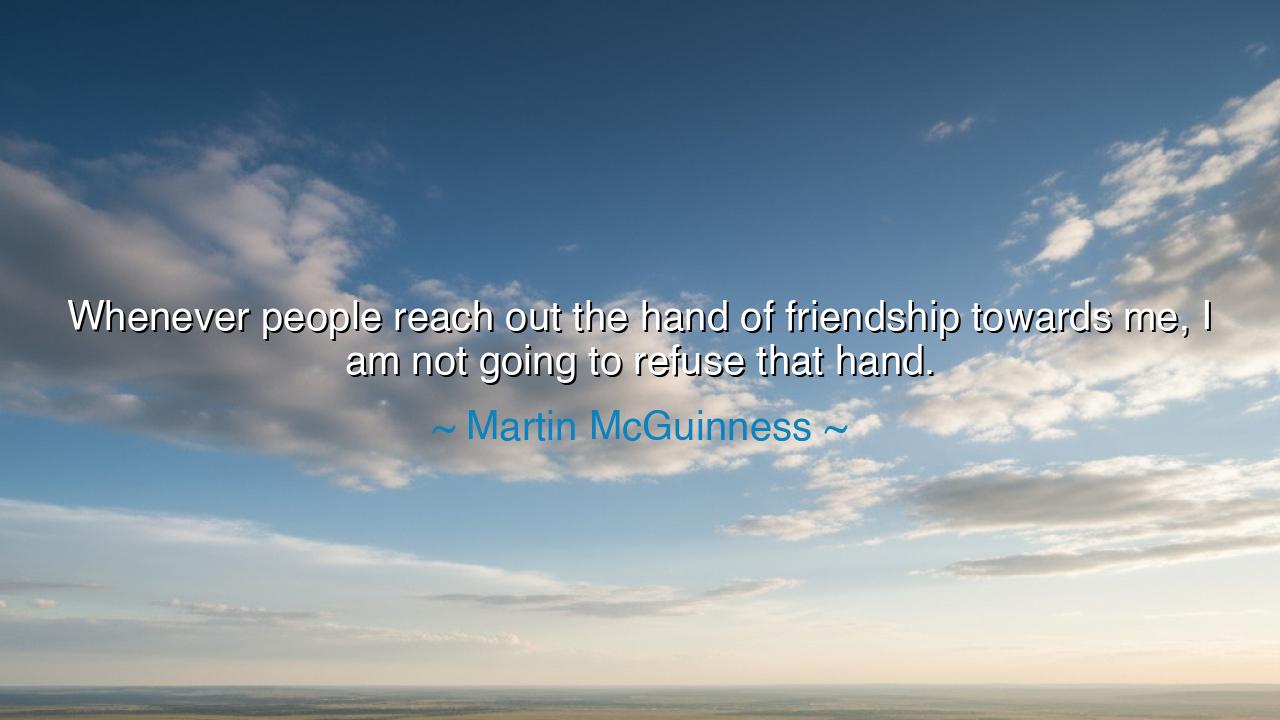
Whenever people reach out the hand of friendship towards me, I am
Whenever people reach out the hand of friendship towards me, I am not going to refuse that hand.






In the long, storied history of humanity, there are few acts more powerful than the extension of the hand of friendship. It is a gesture that transcends all divisions, whether of culture, belief, or history. Martin McGuinness's words, "Whenever people reach out the hand of friendship towards me, I am not going to refuse that hand," encapsulate the profound truth that the act of offering friendship is one that requires courage, and the act of receiving it demands humility and grace. The hand of friendship is not always offered in times of peace or ease, but often in times of great struggle and division, making the choice to accept it even more significant.
In the ancient world, there were countless examples of the transformative power of friendship that crossed the boundaries of animosity, whether between nations or individuals. The Greeks, for instance, understood that the greatest friendships were often born not from ease but from the willingness to forgive and to reach across deep divides. Take, for example, the friendship between Cyrus the Great and Croesus. After a long history of conflict and war, Cyrus, having defeated Croesus, could have easily destroyed him. Yet, he chose not only to spare the defeated king but to offer friendship. This act of reaching out to a former enemy illustrates the profound strength of accepting the hand of friendship, even in the face of past conflict. McGuinness, too, chose to accept such a hand—perhaps most poignantly in his decision to engage in the peace process during the later years of his life, after a history marked by intense conflict in Northern Ireland.
The choice to accept friendship is not merely a passive act, but one of great moral courage. In the same vein as Cyrus the Great, who extended his hand of friendship to those he had defeated, McGuinness made a choice that required strength. To lay aside past animosities, to engage with those who had once been enemies, is a noble and difficult endeavor. This is true in both the realm of politics and personal relationships. In the ancient world, leaders who reconciled with former enemies were often hailed not just for their wisdom, but for their ability to recognize the humanity in others, even those who had once been adversaries.
In the realm of Romans, the concept of reconciliation was central to the Republic's survival. Cicero wrote extensively on the idea that peace and friendship could only be sustained through the recognition of shared humanity and the willingness to forgive. A classic example is the eventual reconciliation between Julius Caesar and Pompey the Great after years of political rivalry. While their relationship ultimately ended in betrayal, their early alliance—marked by mutual respect and the extension of friendship—served as a lesson that the greatest political and personal achievements often come when people choose to reach out to one another, even when past conflicts linger in the background.
McGuinness’ decision to embrace the hand of friendship speaks to the human capacity for change and healing. His role in Northern Ireland’s Good Friday Agreement is a modern example of this truth. Having been a leading figure in the IRA and a symbol of conflict, he chose to work with his former adversaries for the greater good of peace and reconciliation. This was not just a political maneuver but a deeply personal act of forgiveness. By accepting the hand of friendship, he helped guide Northern Ireland towards a more peaceful future. This decision to accept rather than reject was one of profound wisdom and moral clarity, and it reminds us all that friendship is a force for transformation.
The lesson for us, then, is clear: we must not turn away from the hands of friendship that are extended to us, especially when they come from places of conflict or historical wounds. It is easy to hold onto past grievances, to remain entrenched in old battles, but the true strength of character lies in the ability to let go of the past and embrace the possibility of change. By doing so, we open the door to healing—not just for ourselves, but for the communities and nations we belong to. McGuinness’s life teaches us that accepting the hand of friendship is not just an act of kindness, but one of courage, wisdom, and hope for a better future.
In our own lives, we are often called to make similar choices. Whether in the workplace, family, or community, we are faced with the decision to extend or accept friendship, even when doing so may seem difficult or uncomfortable. Let us take McGuinness’ example to heart: when we are offered friendship, even from those we have disagreed with or opposed in the past, let us accept that hand with the knowledge that it is through forgiveness, understanding, and reconciliation that we can build a future based on shared humanity. By choosing to accept the hands of friendship in our own lives, we too contribute to the creation of a world built on peace, understanding, and mutual respect.






AAdministratorAdministrator
Welcome, honored guests. Please leave a comment, we will respond soon